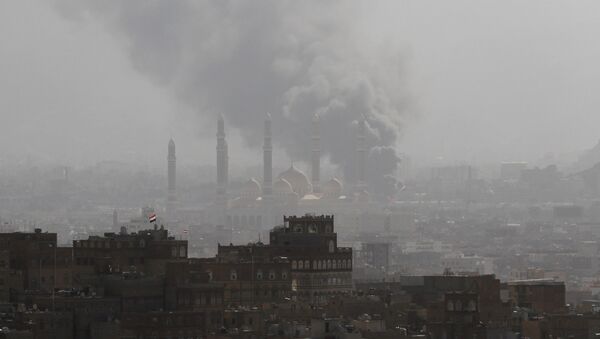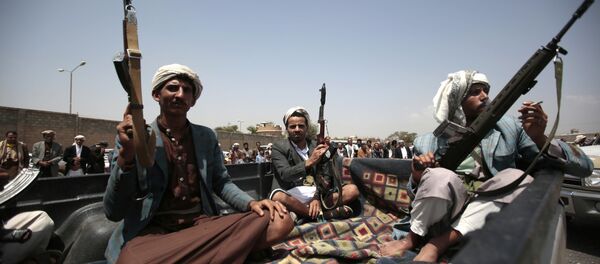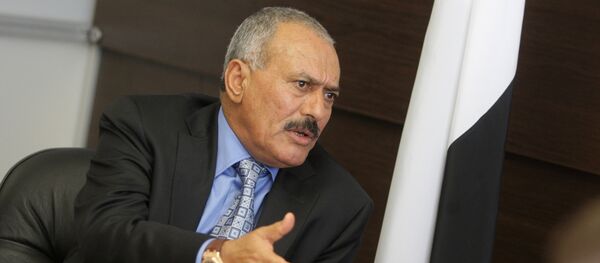MOSCOW (Sputnik) — Local residents told Sputnik about the situation in Sanaa, where on November 29, members of the Houthi movement and army units loyal to Saleh started fighting each other. On Monday, the former president was killed by the same rebels who used to fight alongside Saleh’s troops against the Yemeni government led by President Abd Rabbuh Mansur Hadi.
Humanitarian Situation
The fighting in Sanaa has caused "severe shortage in basic needs," Ameen Saleh Al-Ward, a resident of the capital who used to teach Arabic to non-native speakers at Yemen Institute for Arabic Language, told Sputnik.
"The streets are still empty of vehicle movement and pedestrians, and shops are closed," Al-Ward said, describing the current living conditions of Sanaa residents as "really miserable."
READ MORE: What Does the Death of Former President Saleh Mean for the Yemeni Civil War?
The United Nations on Monday urged the conflicting parties in Sanaa to enable a humanitarian pause so that aid could reach civilians in need. UK-based charity Oxfam supported the call on Tuesday, with Deputy Humanitarian Director for Oxfam's Global Humanitarian Team Colette Fearon telling Sputnik that finding a political solution remains the only way to end the crisis.
"We still have no access to the warehouse where our medicine is, and we need urgent access because hospitals are in need of this medical material, particularly for those wounded in war. We still have no access because of the presence of gunmen," Iolanda Jaquemet, the public relations officer for Near and Middle East at ICRC, told Sputnik on Tuesday.
Life in Sanaa
Abeer Alaya, a student at the Lebanese International University in Yemen, said the situation in the capital was "too bad."
"Colleges, companies and schools are closed. Streets are empty. The situation is very complicated, though we stopped all activities since the situation is very complicated. Now we don't know what we can do," he said.
Alaya stressed that the university and its students were in a difficult situation and did not know if they would be able to complete their studies if the crisis continued.
READ MORE: Yemen's Houthis Vow to Release Reporters They Are Holding — Official
Al-Ward noted that since the beginning of Yemen's crisis in 2015, many non-Arabic students from the Yemen Institute for Arabic Language have left the country, forcing him to switch over to teaching online courses.
View From South
Despite claiming that the events in Sanaa have not affected the activities of Aden University in southern Yemen, Ahmed Alsaiaad, the general manager of its IT department, stressed that the people in the city were worried and frightened about their future.
"The conflict in the north is around the forces of influence right now, and we hope that it will not affect the south region," Alsaiaad told Sputnik.
"In the south, in general, the security situation is good, while the economic situation is going to really bad, which affects the people lives because of the government corruption and mismanagement. While in the north of Yemen, which is controlled by Houthis, the security situation [is] unstable [as well], besides the bad economic situation," he explained.
Ex-President's Death
Reactions to the death of former President Saleh have differed, according to Al-Ward.
"People in Sana'a fall into two parties, the first party who work pro-Houthis are celebrating, and the second party who work pro-Saleh … are in a state of shock and deep sadness," he explained.
The Houthi rebels told Sputnik on Tuesday that they were ready to hand over Saleh's body to his family if asked to do so, refuting media reports that they demanded Saleh be given a discrete funeral in exchange for releasing his body.
READ MORE: What the Future Has in Store for Yemen After Ex-President Saleh's Assassination
Earlier in the day, media reports emerged that Saleh was buried without official ceremony in his native district of Sanhan. Other media claimed that the burial, attended only by few family members, took place in Sanaa.
Over 230 people have been killed in clashes in the Yemeni capital, the ICRC told Sputnik on Tuesday, with the agency’s representative in Sanaa saying that the situation in the city has become slightly more calm.




